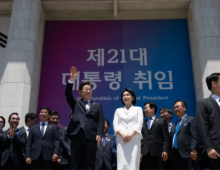2003 directive allows some deployments without parliamentary oversight, but critics say it doesn’t apply in Ukraine case
A silhouette of a military observer in front of a map of Ukraine | Image: Korea Pro, Canva, edited by Korea Pro
South Korea’s proposal to send an observation team to Ukraine has sparked a heated debate, raising questions about the country’s legal and procedural limits for deploying military personnel abroad.
Defense minister Kim Yong-hyun argued on Monday that sending a small, unarmed team to monitor the Ukraine conflict is lawful under the Directive on Overseas Deployment Operations of the Republic of Korea Armed Forces. However, opposition voices have challenged this view, maintaining these plans run counter to the language of the law and historical precedent.
South Korea’s proposal to send an observation team to Ukraine has sparked a heated debate, raising questions about the country’s legal and procedural limits for deploying military personnel abroad.
Defense minister Kim Yong-hyun argued on Monday that sending a small, unarmed team to monitor the Ukraine conflict is lawful under the Directive on Overseas Deployment Operations of the Republic of Korea Armed Forces. However, opposition voices have challenged this view, maintaining these plans run counter to the language of the law and historical precedent.
Get your
KoreaPro
subscription today!
Unlock article access by becoming a KOREA PRO member today!
Unlock your access
to all our features.
Standard Annual plan includes:
-
Receive full archive access, full suite of newsletter products
-
Month in Review via email and the KOREA PRO website
-
Exclusive invites and priority access to member events
-
One year of access to NK News and NK News podcast
There are three plans available:
Lite, Standard and
Premium.
Explore which would be
the best one for you.
Explore membership options
© Korea Risk Group. All rights reserved.
No part of this content may be reproduced, distributed, or used for
commercial purposes without prior written permission from Korea Risk
Group.












